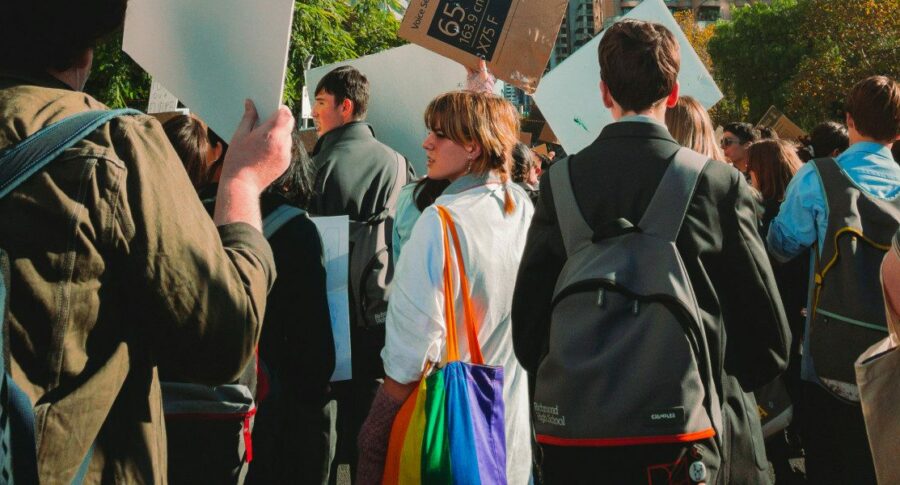Everywhere you look, social issues are in the headlines. Learn how you can commit to making a difference while avoiding burnout.
Turn on the news or open social media on your phone and there it is: American society, rife with issues of racism, gender inequality, and economic disparity. The world needs people who commit to addressing social justice, but altering mindsets, systems, and society as a whole can be grueling.
For those of us working toward a more just and equitable world, it’s crucial to actively recognize and mitigate potential burnout. By protecting your mental health, you will be better prepared to create and drive societal change through sustainable social justice efforts.
How to Incorporate Social Justice Work Into Daily Life
For many who seek to make a difference, the process can seem daunting. However, integrating social justice work into your life doesn’t require grand gestures or a complete lifestyle overhaul. It’s about making thoughtful choices and cultivating habits that align with your values.
In this section, we'll break down how to weave social justice into the fabric of your everyday life. Consistent, small actions can accumulate to create a significant impact. By integrating these practices into your daily routine, you can make a difference in long-term, sustainable ways.
Educate With Credible Sources
The first step toward centering social justice in your daily life is to educate yourself about important issues using reputable sources.
Accuracy is key, as spreading misinformation can do more harm than good. In 2021, The Washington Post shared how the spreading of a trafficking conspiracy theory led to organizations having to reallocate resources in order to combat the false narratives spiraling in the media.
The takeaway? If you’re exposed to a topic for the first time on social media (or any other form of media), be sure to fact-check with credible sources to ensure its accuracy.
Turn Knowledge Into Action
Knowledge has power. Knowledge put into action changes the world.
Once you’re educated on an issue, act on it. Your actions don’t have to be time-consuming or a financial burden—they can be as simple as signing a petition, voting, or volunteering. Think about how you move through the world, and let your knowledge guide your daily actions. For example, where are you choosing to spend your money? What companies do you support financially?
If you’re looking to make a substantive change outside of your norm, join a larger effort such as Saybrook Serves. In this program, Saybrook University facilitates virtual and in-person community service opportunities to positively impact the community.
Social change comes from both individual and collective effort, and every action you take is a step toward long-term progress.
Speak Up
Our communities are shaped by each of us: how we interact with one another and what we allow as acceptable behavior. Change often requires courage.
Annette Anderson-Engler, Ph.D., interim department chair for Integrative Social Work at Saybrook University, says, “Embracing a humanistic perspective that supports social justice and anti-racism as a way of life builds up and preserves the human dignity of all people.”
If you see injustice in real time, act. Speak up for someone. Educate another. Spreading awareness is a key aspect of social justice work. The goal is not to “win” but to share understanding. Ground your communication in care for the other person and the community.
Protecting Mental Health to Create Sustainable Change
To create long-term change, you need a social justice practice that is sustainable—which means protecting your mental well-being.
A 2015 study found that 71.4% of individuals experienced a deterioration of mental health stemming from their social justice efforts. Unlike temporary bouts of fatigue, this often results in feelings of depletion and constant alertness that can even manifest into physical health issues, such as chronic fatigue, insomnia, and nutritional deficiencies. The perception that self-care is a privilege, rather than a necessity, creates a cycle of poor health.
Playing the long game can also be demoralizing for those doing social justice work. One of these study participants said, “I never feel that I’m doing enough … like the feeling you’re only scratching the surface of what needs to be done.”
These signs of burnout can easily lead people to withdraw from social justice altogether. To tackle these added stressors, use burnout prevention strategies.
How to Integrate Self-Care Into Social Justice Practice to Create Long-Term, Sustainable Change
First Self-Care, Then Societal Care
Social justice work is emotionally labor-intensive, so it’s important not to neglect your low-maintenance hobbies and activities. Self-care practices provide a reset during times of stress, decreasing the feeling of constant anxiety.
If you’ve been on a plane, you know the protocol is to put on your own oxygen mask before you can help others. Apply that mentality to self-care to ensure burnout doesn’t subsequently harm yourself and others. Boundaries that maintain both social justice and personal efforts are key.
Seek Support for Mental Health
Whether your desired form of support is from mental health professionals or through your community, it is crucial to surround yourself with people who understand the unique challenges of social justice work. They can provide personalized strategies to manage stress while simultaneously combatting feelings of loneliness.
“Saybrook University allows ways for all people to participate in human dignity practices by working together,” Dr. Anderson-Engler says. “Through the building of more inclusive communities, Saybrook offers safe spaces to share stories about positive social change. Saybrook encourages the exchange of storytelling dialogue so that individuals may freely express their views of hope for humanity in an ever-changing world.”
Take Breaks and Practice Mindfulness
Prioritizing your well-being impacts both your personal health and your capacity for engaging in long-term social justice efforts. Identify when you’re experiencing the signs of burnout, and take breaks away from active efforts, social media, and other stressors.
You can also make your efforts more sustainable by adopting holistic practices to mitigate fatigue and burnout. Mindfulness practices—such as meditation, breathing exercises, and journaling—can be helpful in maintaining emotional balance. These practices can help activists stay grounded and present, reducing the risk of burnout.
Dr. Anderson-Engler endorses self-reflection to establish a strong sense of meaning,
“Small group work, specifically transformative mediation and peacebuilding practices are self-care strategies specifically suited for activists and advocates,” she says.
Try incorporating transformative meditation in your routine by checking out Saybrook University’s Mindfulness Moments podcast episodes, hosted by Mind-Body Medicine faculty.
Celebrate All Milestones
Acknowledge and celebrate your achievements, whether big or small. This could include minor achievements. For example, educating a family member on a social justice issue. It could also involve larger-scale accomplishments, such as advocating for policy changes. It’s important to remember your efforts aren’t defined by the immediate results. Recognizing progress can boost morale and reinforce the value of continued effort.
Saybrook Is a Leader in Driving Social Change. We Invite You to Join Us.
At Saybrook, we know that social change must happen at both the individual and collective levels.
We are committed to providing students with hands-on experience, giving them opportunities to apply their learning to real-world challenges. Through this application, students are given the foundation to take on sustained social justice efforts throughout their careers.
Explore how you can drive social change through our Ph.D. in Integrative Social Work and M.A. in Transformative Social Change programs.
Find Out More
Recent Posts































